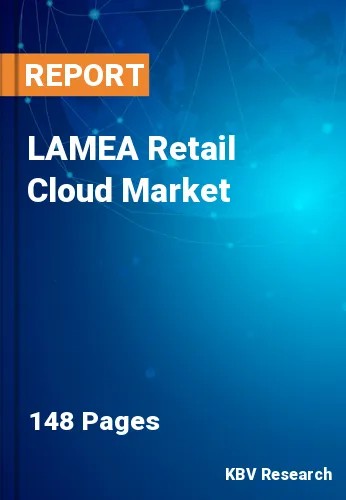The Latin America, Middle East and Africa Retail Cloud Market would witness market growth of 25.4% CAGR during the forecast period (2023-2029).
The retail sector is implementing more sophisticated solutions as cloud-based technologies become more prevalent. To host, store, and manage large data volumes, cloud computing enables end users to access a network of remote servers hosted via the Internet. Retail businesses and retailers can benefit from increased speed, security, and agility by moving their business applications and infrastructure resources to different service platforms or the cloud, such as Platform as a Service (PaaS), Software as a Service (SaaS), and Infrastructure as a Service (IaaS).
Supply Chain Management (SCM), labor management, customer management, merchandising, omnichannel, reporting & analytics, data security, and other tasks are among the activities for which cloud computing technologies are available. As a result, the retail sector gains access to new options due to cloud computing, making management simple and contributing to higher consumer demand. When cloud computing services are implemented in the retail industry, IT costs are decreased, workflow is streamlined, productivity is increased, profitability is increased, data security is improved, and the end-user experience is enhanced.
Commercial structures like malls, specialty stores, and supermarkets have received a lot of investment in the region. As a result, the growth of the commercial infrastructure is fueling the expansion of the region's retail sites for well-known companies. The adoption of virtual fitting technology by regional retail enterprises is the main factor driving the growth of the regional market. In order to combat COVID-19's major economic impact, nations like the UAE have taken the necessary steps to maintain regional economic activity. The UAE's government is promoting cutting-edge technologies to increase industrial productivity. All these aspects are predicted to boost the growth of the regional market.
The Brazil market dominated the LAMEA Retail Cloud Market by Country in 2022 and would continue to be a dominant market till 2029; thereby, achieving a market value of $3,183 million by 2029. The Argentina market is exhibiting a CAGR of 26.1% during (2023 - 2029). Additionally, The UAE market would showcase a CAGR of 25.1% during (2023 - 2029).
Based on Organization Size, the market is segmented into Large Enterprises and SMEs. Based on Service Model, the market is segmented into Software as a Service, Platform as a Service, and Infrastructure as a Service. Based on Component, the market is segmented into Solution (Supply Chain Management, Customer Management, Workforce Management, Merchandising, Reporting & Analytics, Data Security, Omni-channel and Others) and Services. Based on Deployment Model, the market is segmented into Public Cloud, Private Cloud, and Hybrid Cloud. Based on countries, the market is segmented into Brazil, Argentina, UAE, Saudi Arabia, South Africa, Nigeria, and Rest of LAMEA.
Free Valuable Insights: The Worldwide Retail Cloud Market is Projected to reach USD 133 Billion by 2029, at a CAGR of 19.2%
The market research report covers the analysis of key stake holders of the market. Key companies profiled in the report include Alibaba Cloud (Alibaba Group Holding Limited), Cisco Systems, Inc., Salesforce, Inc., SAP SE, IBM Corporation, Oracle Corporation, Accenture PLC, Amazon Web Services, Inc (Amazon.com, Inc.), Microsoft Corporation and Google LLC (Alphabet Inc.)
By Organization Size
By Service Model
By Component
By Deployment Model
By Country
Our team of dedicated experts can provide you with attractive expansion opportunities for your business.

